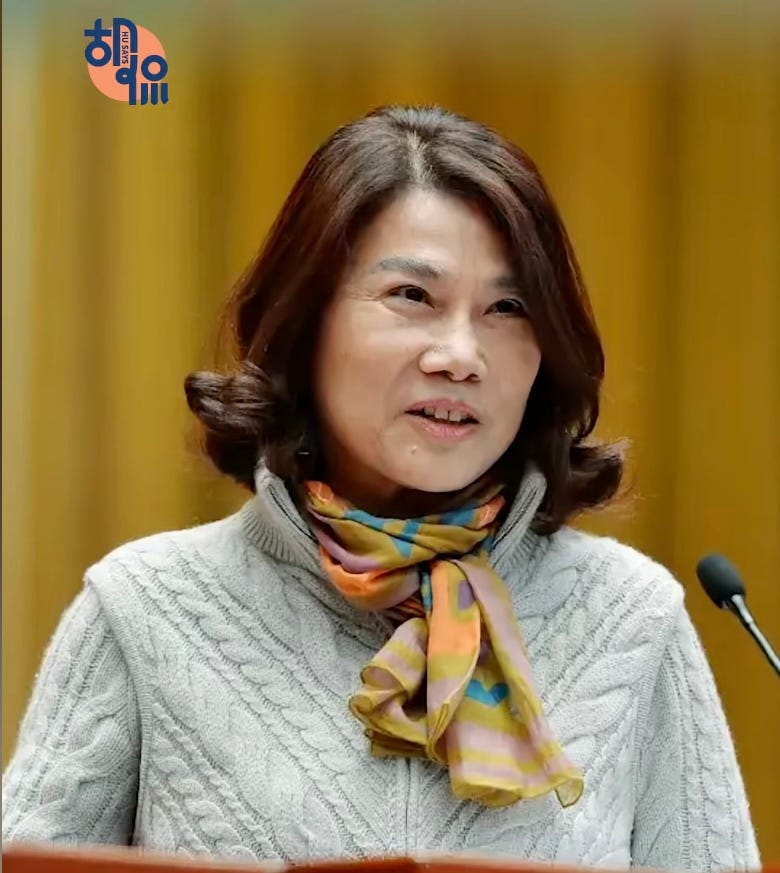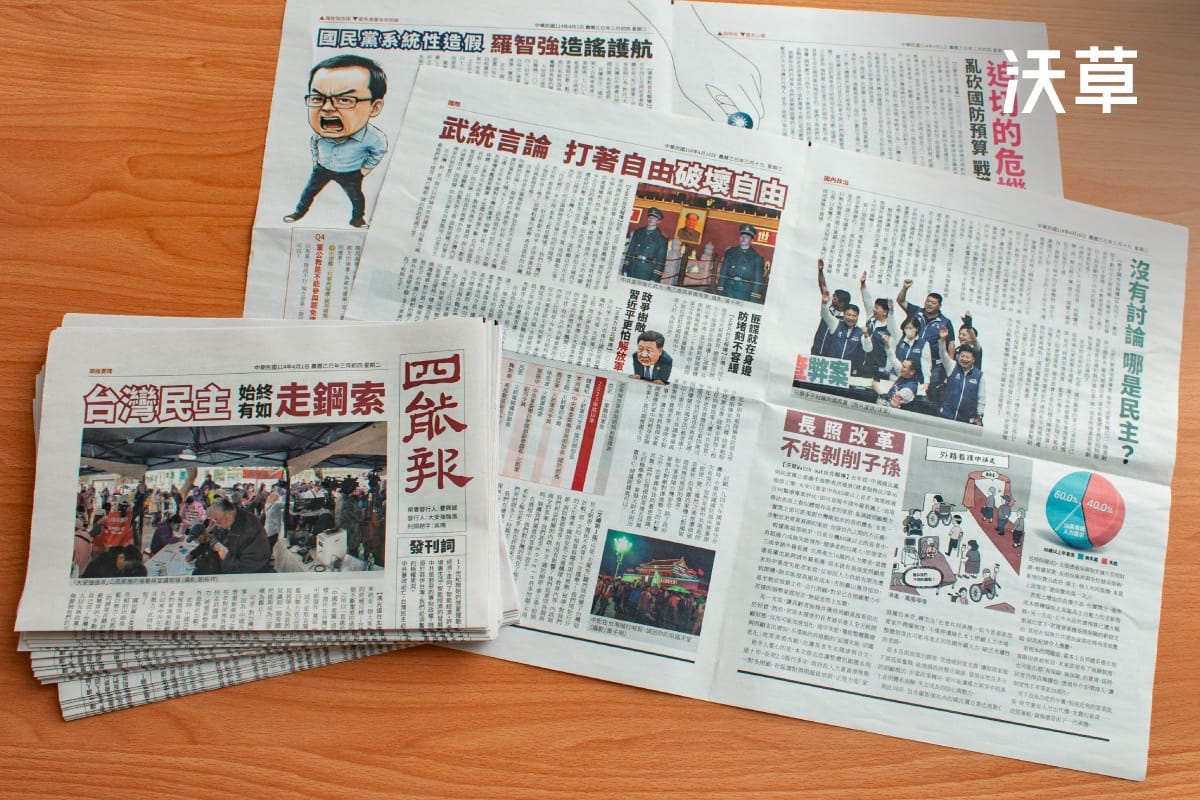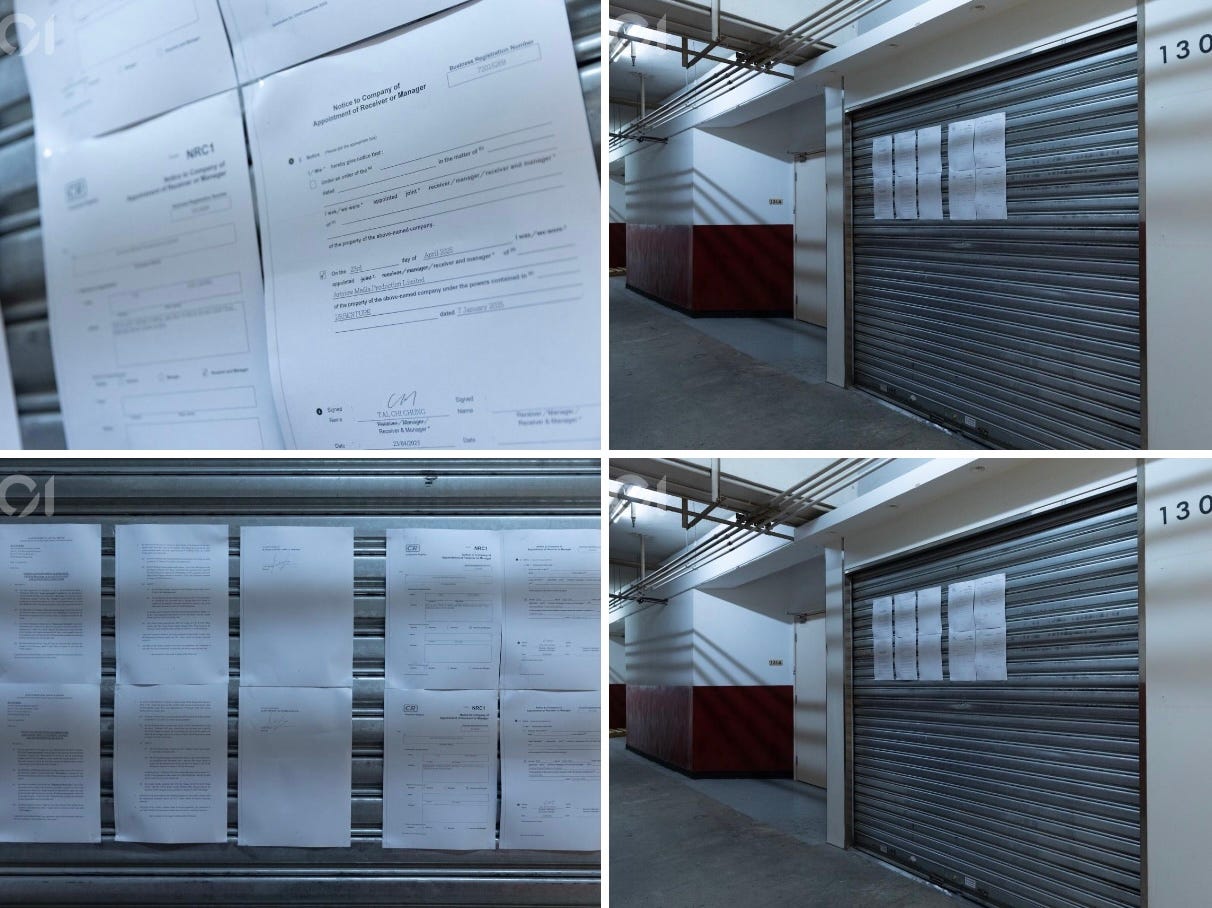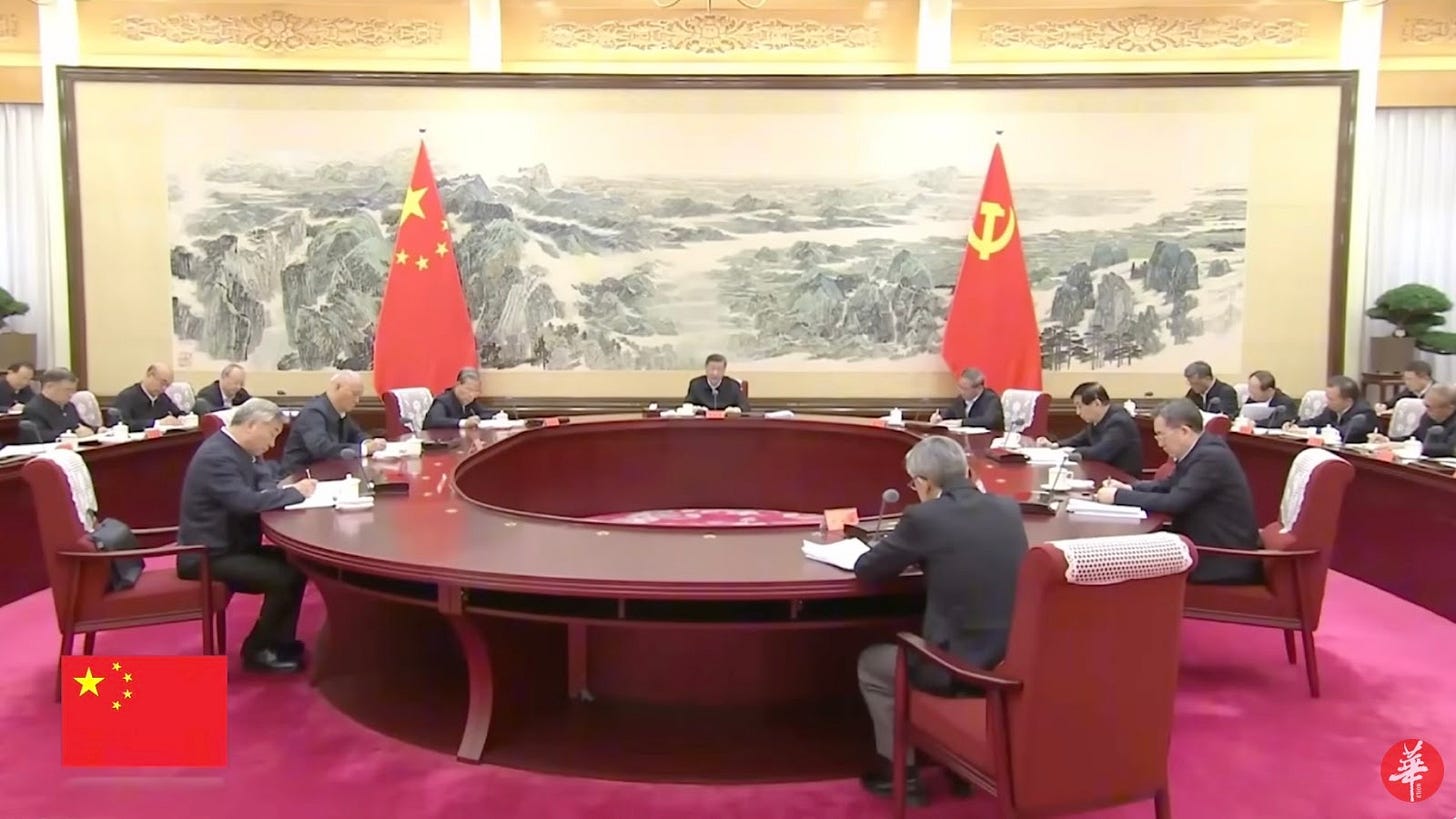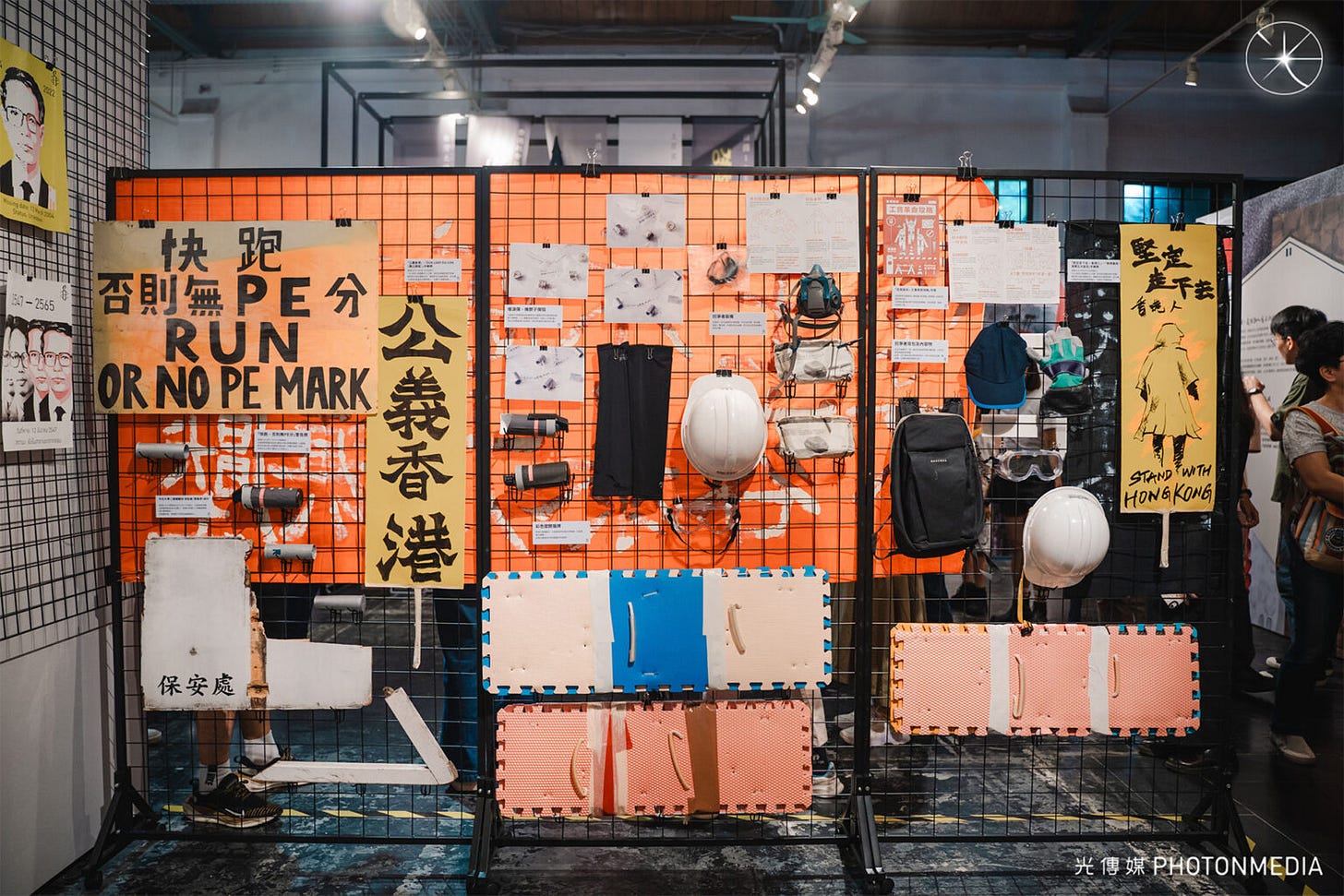Lingua Sinica Newsletter, 2 May
News, analysis, and commentary on Chinese-language media from the PRC and beyond.
Welcome back to Lingua Sinica.
In a nod of respect to May Day, a public holiday here in Taiwan as in many other places across the world, we postponed our usual Thursday newsletter — a celebration of the labor movement and the rights of the tireless media researcher. We hope each and every one of you had a chance to put up your feet.
As is typical during the extended May 1 holiday, China's official People's Daily newspaper has trimmed down to eight pages this week from its usual 16. That has hardly tempered the consistency of its message, however, amid persisting trade tensions with the United States. The key phrase on page one yesterday was both a declaration of steadfastness and a hint at the probable depth of the leadership’s unease: "No matter how the external environment changes, China will maintain confidence and focus on managing its own affairs." This was a more sedate echo of a message of defiance on Tuesday in the form of a viral video called “Never Kneel Down!” released by the Ministry of Foreign Affairs (MFA). Thanks to widespread treatment by scores of outlets — including the Washington Post, Reuters, the Wall Street Journal and many more — that video has come to define what some commentators have read as an escalation of China’s rhetoric.
In fact, this messaging — that the US is hypocritical and damages the global order — is quite consistent with the longer arc of external propaganda (外宣) over the decades. Despite talk in some media this week of China’s “sweeping and dramatic rhetoric,” this is something we have seen before. Lest we forget, provocation was standard fare from the tail end of the last Trump administration, as China aggressively defended its approach to COVID-19. Since 2021, the leadership has taken a somewhat softened, if no less insistent, approach, with Xi Jinping calling in May that year for China to be more "lovable" through its global communication. The wolves of the foreign ministry have growled less frequently. But the more pertinent point, looking at this week's video in context, may be that the conduct of the Trump administration is now a closer fit in practice with Beijing's antagonistic framing. Real global anxieties stemming from decisions made directly from the Oval Office may have encouraged China to dust off propaganda tactics it shelved after the pandemic — trusting that there is now less appetite for civility.
But enough from me. On to our selection of stories in the Chinese-language media space.
Enjoy!
David L. Bandurski
CMP Executive Director
REDLINES
Red and Green
China has encouraged criticism of Taiwan's ruling Democratic Progressive Party on social media platforms. But the terms of criticism are highly sensitive for the risk-averse Chinese Communist Party.
As Taiwan's opposition Kuomintang party, or KMT, organized a mass protest along Ketagalan Boulevard in Taipei on April 26 to voice opposition to President Lai Ching-te (賴清德), state media in China quickly grasped the opportunity to attack Lai and his Democratic Progressive Party (DPP). The substance of the protests, however, was a nagging point of sensitivity in China's highly controlled information environment, where protests are sensitive by their very nature.
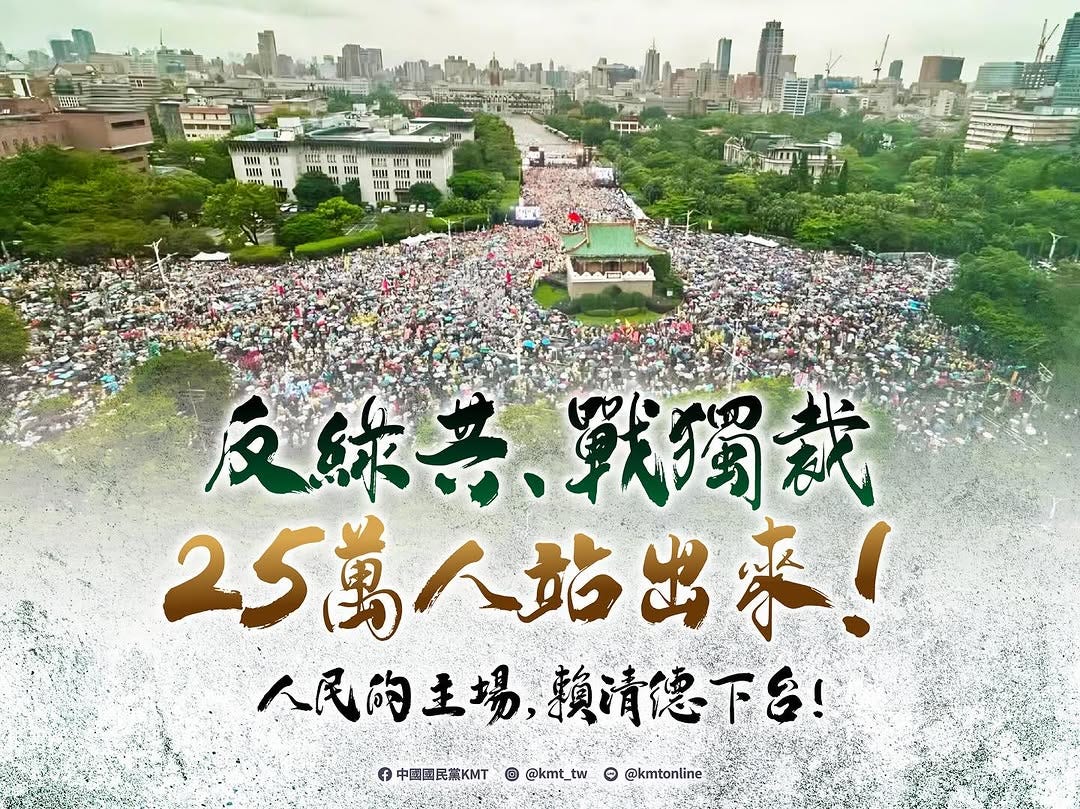
State-run outlets including China News Service (中新社), operated by the United Front Work Department of the Chinese Communist Party, amplified KMT claims about the protest size, reporting that dissatisfaction with Lai had pushed “more than 250,000 people to rally in the rain.” Reports from media including Taiwan’s United Daily News and Hong Kong's South China Morning Post cited police sources, however, that estimated a much lower turnout of about 60,000 people.
But as the news filtered into China, the terms actually used by KMT protesters were a key point of extreme sensitivity. It did not help the narrative framing of the Chinese Communist Party that KMT chairman Eric Li-luan Chu (朱立倫) told rallying supporters that the DPP was "more communist than the Communist Party, and more fascist than fascists" (比共產黨還共產黨,比法西斯還法西斯). And the central message of the protests, "oppose the Green Communists, fight dictatorship" (反綠共、戰獨裁), was not a rallying cry that could be translated without dangerously undermining CCP credibility on the home front.
According to a study by Taiwan's Information Environment Research Center (IORG), an independent research group, the KMT’s rhetoric about “opposing the Green Communists” — as well as general reference to the term "Green Communist" (綠共) — was actively removed by Chinese authorities online. IORG documented that posts containing “Green Communist” remained visible for an average of 15.4 hours before removal, though some references endured as long as 29 hours.
IORG noted the inconsistent approaches to censorship inside China, likely suggesting an interest in amplifying anti-DPP language to Taiwanese audiences while containing blowback from other netizens inside China. Posts on the popular Weibo platform by Taiwanese politician Wang Ping-chung (王炳忠) of the New Party making references to “Green Communists” remained accessible. Meanwhile, a post from the pro-China Chung T'ien Television (CTiTV) that reported remarks from KMT chairman Eric Chu likening President Lai to a "communist dictator" was swiftly deleted. "Weibo's censorship mechanism shows inconsistent standards with potential 'privileged accounts' receiving exemptions," IORG noted.
(NOT) IN THE NEWS
Anti-Spy Hiring Policy
Gree CEO sparks anger by refusing to hire "spy risk" overseas graduates
Foreigners aren't the only ones in Xi's China who are at risk of spying accusations. At the annual shareholders meeting of Gree Electric Appliances Ltd, an electronics conglomerate based in Guangdong, CEO Dong Mingzhu (董明珠) said the company "absolutely does not use overseas returning students" (海归派) because of the risk some have been turned into spies. "I have to choose conservatively," said Dong.
The CEO is known for stirring up controversy, and this time was no exception. Her words racked up hundreds of millions of views on Chinese social media, with some netizens praising Dong and others mocking her, wondering what spies would find among the company's stock of air conditioners.
Youth unemployment is a frustrating topic in Chinese society, with many young people investing a great deal of personal wealth studying abroad in the hope this will improve their chances on the job ladder. Major central state news outlets like Xinhua and CCTV have not run the story. Indeed, in the past the latter celebrated Dong's reputation for controversy as an asset. But the story has appeared in newspapers under the state-owned Shanghai United Media Group, including The Paper and the Xinmin Evening News. The latter called Dong's remarks "absurd" and potentially damaging to the prospects of returning students.
On social media, the prominent Weibo user "Liu Ji Shou" (留几手) declared, "In light of Ms. Dong Mingzhu's public discrimination against overseas returnees seeking employment, I announce that until Ms. Dong publicly apologizes and retracts her statement, my family will refuse to purchase any Gree products. We mean what we say!"
Unholy Silences
China turns a cold shoulder on Pope Francis's funeral despite a decade of Vatican outreach.
On April 22, the day after the death of Pope Francis, China's official Xinhua News Agency published a brief official release (通稿). As is general practice, the release was subsequently republished by other state-run media, including the People's Daily. During the press conference later that day, Ministry of Foreign Affairs spokesperson Guo Jiakun offered scripted condolences and highlighted "constructive engagement" with the Vatican, while avoiding questions about attending the funeral.
The restraint in coverage reflects the complicated Vatican-China relationship, especially during Pope Francis's pontificate — particularly regarding bishop appointments. Guo stated, "China is willing to make joint efforts with the Vatican to promote the continued improvement of China-Vatican relations," but China ultimately declined to send any delegation to the April 26 funeral.
Commentator Michael Chambon described China's absence as "a slap to Pope Francis," noting that "from the very beginning of his papacy, Pope Francis showed particular attention to China." Despite the diplomatic snub, China did authorize Hong Kong Cardinals Joseph Zen and Stephen Chow to travel to the Vatican, with Cardinal Chow participating in the conclave.
Media outlets in China generally adhered to the language of Xinhua and the MFA, with the Global Times (环球时报) being a rare exception that covered the funeral logistics, citing Vatican News. Notably silent was the website "Catholic Church in China" (中国天主教), operated by the Chinese Catholic Patriotic Association (CCPA), an organization closely linked to the United Front Work Department of the CCP. Following the death of former Pope Benedict XVI in December 2022, the CCPA’s website did issue a condolence statement — although the message was later removed from the CCPA site. This time, however, the site, a CCP-led voice on Catholic matters, posted no message after Francis’ death.

SPOTLIGHT
Pulp Politics
As Taiwan is swept by a wave of recall campaigns, some activists are reaching citizens with innovative media approaches — in print.
You might call it an ink insurgency. As Taiwan's so-called "Great Recall" (大罷免) movement, a wave of campaigns to remove newly elected legislators through citizen petitions, has taken the country by storm, creative print media initiatives have emerged to reach voters in traditional strongholds for the Kuomintang (國民黨) party, whose members tend to be older and more politically conservative — and much less digital savvy — than their counterparts in the ruling Democratic Progressive Party (DPP). According to a fascinating report by the watchdog organization Watchout (沃草), these print strategies aim to connect with digitally-disconnected constituencies as campaigners face a 60-day window to gather a sufficient number of signatures to push recall actions.
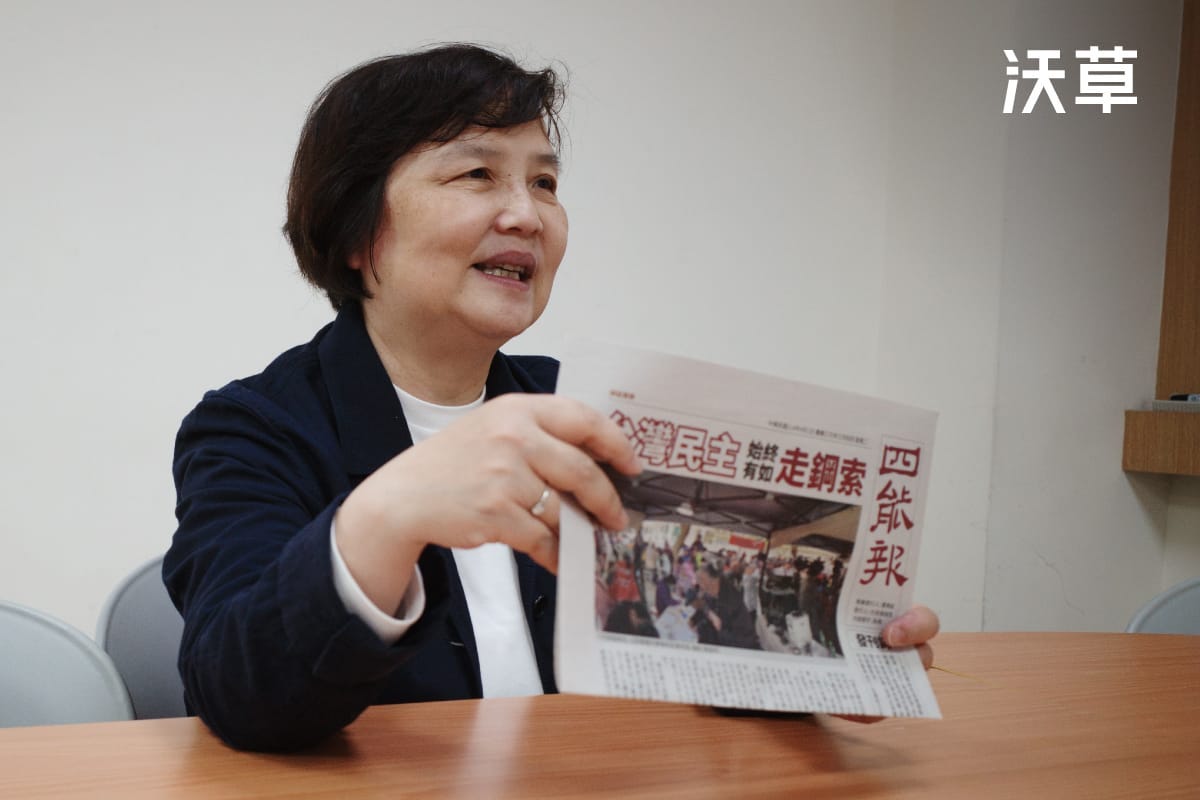
Media veterans in Taipei's Da'an district have launched "Four Able News" (四能報), a biweekly publication promoting the recall of KMT legislator Lo Chih-chiang (羅智強), while activists in Xizhi, an inner city district in eastern New Taipei City, have created "Shrimp News" (蝦報) to campaign against KMT legislator Liao Hsien-hsiang (廖先翔), referencing his "shrimp diplomacy" controversy (He proposed resuming cut-off diplomatic relations with Honduras back in January as shrimp exports to the country from Taiwan dropped sharply). In Hualien, DPP-aligned recall campaigners have placed advertisements in the traditionally pro-KMT Update Daily (更生日報), featuring painter Chen Cheng-po's (陳澄波) artwork to appeal to local sentiment.
These diverse print campaigns share a common strategy: bypassing digital barriers to reach older, more conservative voters. In north Songshan district, recall groups have even leveraged imagery of former KMT dictator Chiang Kai-shek (蔣介石), the architect of the country’s White Terror, to connect with traditional KMT supporters, demonstrating how the movement is adapting traditional media for modern political activism.
FLASHPOINTS
"C" is for Closure
Another Hong Kong independent outlet is shutting its doors.
Hong Kong online media outlet Channel C, an independent site founded in July 2021 by former journalists from Apple Daily (蘋果日報), ceased online updates more than a week ago, on April 23, as its 29 editorial staff halted work over unpaid wages and benefits. Channel C’s troubles deepened in mid-April after owner Chen Zhixing (陳智行) was arrested for allegedly defrauding a government loan program of HK$12 million.
Reporting on the story, the news outlet HK01 included images of a takeover notice posted by a creditor, JL Investment Capital Limited, outside Channel C's shuttered Kwai Hing office on April 25. According to HK01, the debt holder had offered HK$100,000 monthly, or just under 13,000 US dollars, to allow Channel C to maintain operations. But this fell far short of the estimated HK$470,000 required monthly to sustain full staffing, and the outlet’s staff reportedly rejected this proposal, which they said showed no sincere long-term commitment to quality journalism. Channel C's parent company, Artview Production Limited, has had its accounts frozen since mid-April.
IN THE NEWS
Directing AI
As Xi calls for homegrown AI technology, provincial leaders scramble to show alignment with these (not-so-new) priorities.
China's Politburo held its second study session on artificial intelligence last week, underscoring the technology's strategic importance. Following a lecture by Zheng Nanning (郑南宁) of Xi'an Jiaotong University, a leading Chinese expert on the engineering technology of AI and pattern recognition, Xi Jinping emphasized continued innovation in AI's basic theories and core technologies while stressing the need to "construct a self-controlled, collaboratively operational AI foundation software and hardware system" — a call essentially for technological independence from foreign suppliers and platforms.
Provincial leaders across China swiftly demonstrated alignment with Xi's directives through public declarations, a process often referred to as biaotai (表态). Officials in Zhejiang, Jilin, and Shandong provinces convened special meetings to implement the instructions. In Zhejiang, Party Secretary Wang Hao (王浩) echoed this directive, pledging to "seize opportunities, gather strength, raise standards, and ride the momentum to build a new computing power system and accelerate AI+ initiatives." Quite a mouthful. Meanwhile, the Cyberspace Administration of China and other ministries issued the "2025 Key Points for Improving Digital Literacy and Skills for All", which sought to improve digital talent training and expand the digital economy. For more on AI jobs and training, with requisite skepticism, read our recent CMP piece, "China's AI Job Mirage."
SHORT STORIES
| Hong Kong |
Courtroom Press
Hong Kong journalist Selina Cheng (鄭嘉如), the chairperson of the Hong Kong Journalists Association (HKJA) who contends that she was illegally dismissed in July last year by the Wall Street Journal after her election to her HKJA position, appeared in Eastern Magistrates' Court Tuesday through legal representatives in her private prosecution against her former employer. According to the court reporting outlet The Witness (法庭線), Cheng's case involves two charges claiming her employer demanded she withdraw from the HKJA election and later terminated her employment for holding the position. Barrister Ma Ah-shan (馬亞山) represented Cheng in the proceedings, which were adjourned until July 2 by Principal Magistrate So Man-lung (蘇文隆). Hong Kong's Department of Justice reportedly has requested additional time to consider intervention in the case — possibly considering its unwanted visibility on the question of deteriorating press freedoms in Hong Kong.
Archives Against Amnesia
In a citizen effort to preserve several tons of protest memorabilia from Hong Kong covering the period from 2003 to 2019, Hong Kong exiles in Taiwan have established the "Hong Kong Action Archives" (香港行動文獻庫), which will safeguard a wide range of documents and relics — including flags, helmets, and documents from disbanded civic organizations dating back to the 1960s. The executive director of the organization creating the archives, identified in a report by exile outlet Photon Media as "Sam," described their approach as "archival activism." "Through these objects, we can reclaim Hong Kong's history from state narratives," he said. The group plans to launch an online museum within two years and will hold regular exhibitions, beginning with "Memories Face to Face" (記憶對視) in London next month, while a similar initiative, "Hong Kong Accountability Archive" (香港問責檔案庫), focused on documenting police enforcement videos during the 2019 protests, was also established in April.
| Taiwan |
Seeking Clarity
Taiwan's Mirror Media (鏡週刊) recently announced a relaunch in order, the company said, to "deliver clarity" (讓事情講清楚) in what it called a time of "chaos, anxiety, confrontation, and collapse" (混沌、不安、對抗、崩壞). This is the latest metamorphosis for an outlet that has ridden a wave of commercial development in Taiwan's media over the past decade, often capitalizing on sensationalist content and approaches. Mirror Media was first founded in 2016 as a tabloid magazine after Pei Wei (裴偉), the former managing editor of the local edition of Jimmy Lai's Next Magazine (壹週刊), left with several colleagues to create a competing publication. Mirror Media said in its announcement that it aims to provide clarity through professional journalism combined with engaging short videos and AI-enhanced content. The new outlet could be found at www.mirrordaily.news starting yesterday.
A Not-so-Simple Question
A Taiwanese woman was arrested on April 22 after she posted a simple question to social media inquiring whether one of the country's most prominent political figures had passed away. The woman — oddly identified in local media reports as simply a "44-year-old unemployed woman" — was charged with violating Taiwan's Social Order Maintenance Act (社會秩序維護法) by posting the question: "Has Chen Chu died?" on the PTT Bulletin Board System (批踢踢), the largest terminal-based bulletin board system in Taiwan. Chen Chu (陳菊), president of the Control Yuan and chairwoman of the National Human Rights Commission since 2020, is one of Taiwan’s most prominent political figures, and was jailed as a political dissident during the country’s martial law period. The woman facing charges for violating social order claimed that she was responding to an unspecified Threads post about "a celebrity passing away" while remembering news of Chen's hospitalization. Kaohsiung Medical University Hospital "quickly denied the rumors," according to a report from Central News Agency, stating Chen's rehabilitation is "stable and continuously improving." Police tracked the woman through her IP address within four hours. She later apologized, addressing Chen by a popular nickname, writing: "Flower Mom (花媽), I'm sorry to have caused you such a disturbance."

| China |
The River Runs Black
Wu Qiang (吴强), a citizen from the city of Lianyungang in northeastern Jiangsu province, was detained by police on April 11, just two days after posting on Weibo about "black, oil-like pollution" in the local Xinghai River (兴海河) as it passes through the Ganyu High-Tech Zone, home to a number of major manufacturing firms, including Roche Energy, headquartered in Shanghai. Wu was arrested on charges of "picking quarrels and provoking trouble" (寻衅滋事) — a charge often levelled at those carrying out acts of civil disobedience — and remains in custody. The river pollution case, not reported inside China, emerged last week on several social media accounts, including the Substack account Aquarius Era (水瓶纪元).
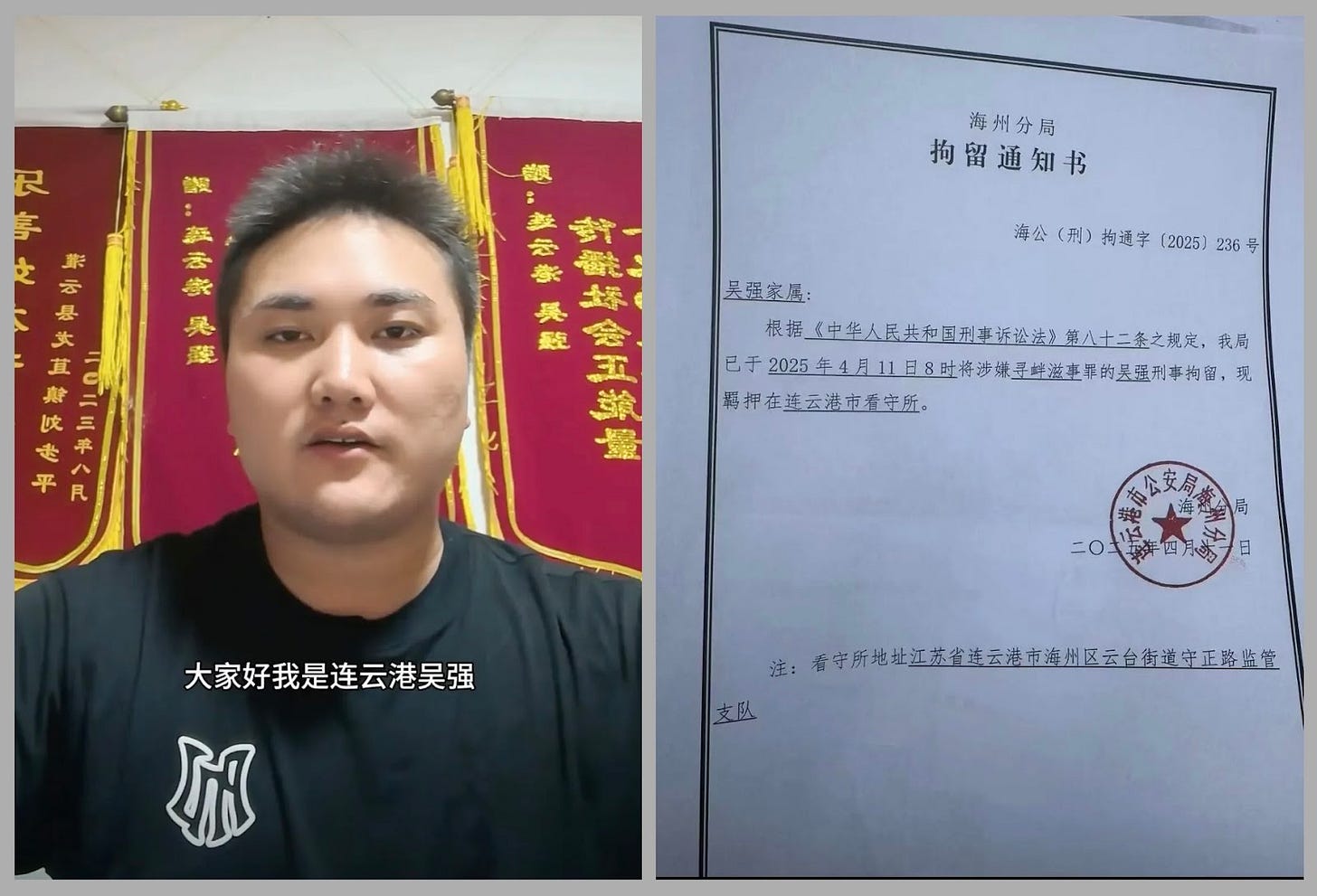
Lost in Translation
A social media frenzy erupted last week after machine translation errors incorrectly identified James Hu, Morgan Stanley's newly appointed vice chairman for China, as Hu Xijin (胡錫進), the controversial former editor-in-chief of the Global Times, Sing Tao Online reported (星島網). The confusion spread when screenshots began circulating on Chinese social media, with one international affairs expert joking that translation software had “terrified” the real Hu Xijin. In reality, Morgan Stanley had appointed Hu Jiguang (胡霽光), grandson of former Communist Party General Secretary Hu Yaobang (胡耀邦) and an experienced investment banker. His sister, Hu Zhizhi (胡知鷙), currently serves as vice chairwoman at UBS Securities, marking the family's prominence in international finance.
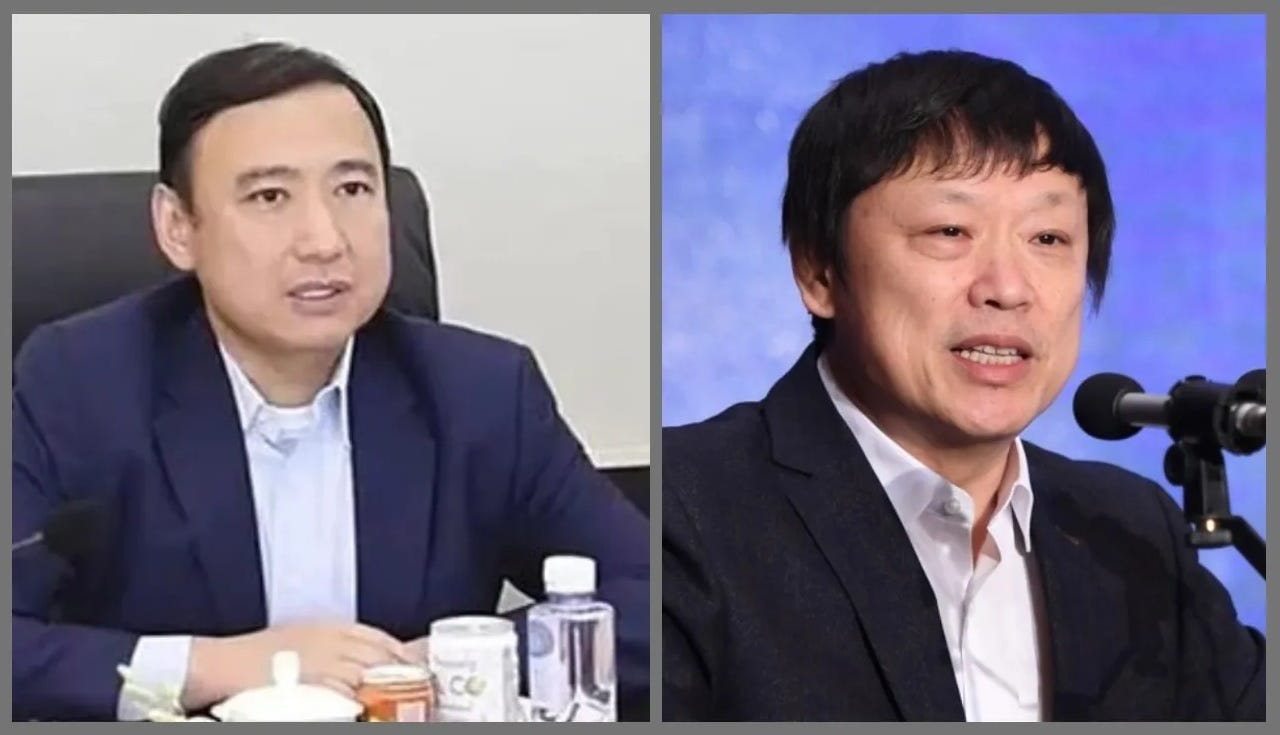
DID YOU KNOW?
A Loyal Megaphone on Labor
While declaring its dedication to laborers in its masthead, the Worker’s Daily has consistently amplified the Party's voice above the factory floor — even as it tries to remain readable, and relevant.
May 1 is a red-letter day for the Chinese Communist Party, which continues to see worker's rights as at the heart of its identity and legitimacy — even, or especially, in a period when well-paying jobs are in short supply and workers are over-qualified. International Labor Day this year also marks the 100th anniversary of the founding of the All-China Federation of Trade Unions (中华全国总工会), a vehicle for strengthening proletarian unity and a CCP power base in the Party's early days. The anniversary celebrations on April 28 made the front page of the People's Daily, with Xi Jinping making a speech about how the federation had been able to "unite and mobilize the working class to follow in the Party's steps."
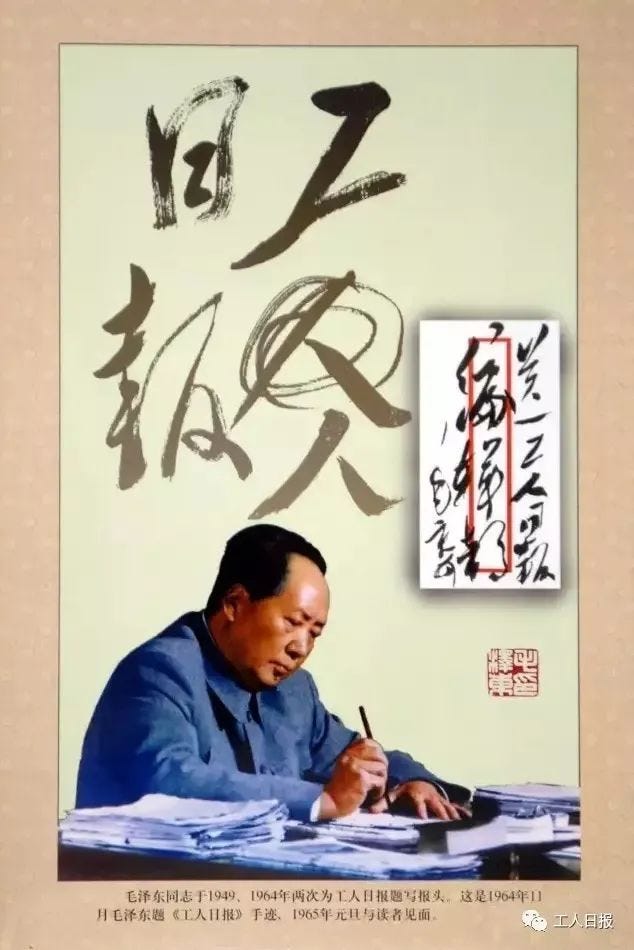
One way they have tried to do so is through their newspaper, the Worker's Daily (工人日报). From the first days after its launch in July 1949, the outlet aimed to serve an audience of blue-collar laborers not used to the heavy ideological prose of the People's Daily. Then-head of the Federation, Li Lisan (李立三) — who had spent his early days as a labor organizer in China’s coal mines — imagined a newspaper that could better guide workers on Party thinking by being relatable. Xinhua bulletins, for example, were re-written for the paper in simpler Chinese, with authors selected from among workers across the country.
Relatable propaganda is an idea Xi Jinping has tried to resurrect from the earliest days of his presidency. "Wherever readers are, wherever viewers are, that is where propaganda reports must extend their tentacles," he told an audience at the PLA Daily in 2015. Like the rest of state media, Worker's Daily has rolled out a news app and accounts on everyday Chinese apps like Douyin, posting videos of heart-warming stories about the toils of modern blue-collar workers across the country.





